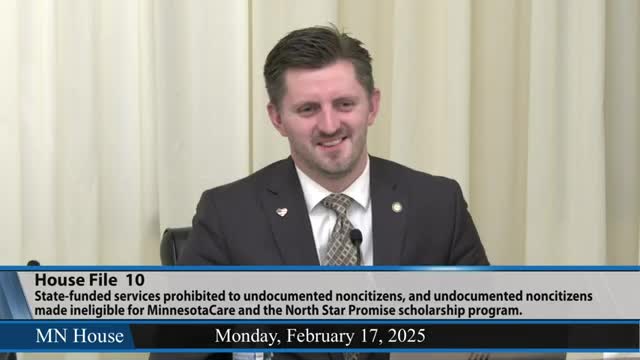Health committee refers bill to restrict MinnesotaCare eligibility for residents without lawful status
Get AI-powered insights, summaries, and transcripts
Subscribe
Summary
The House Health Finance and Policy Committee on Feb. 17 voted 11-10 to refer House File 10, which would remove MinnesotaCare eligibility for people not lawfully present, to the Committee on State Government Finance and Policy.
ST. PAUL, Minn. — The House Health Finance and Policy Committee on Feb. 17 voted along party lines to refer House File 10, a measure that would remove MinnesotaCare eligibility for people who are not lawfully present in the United States, to the Committee on State Government Finance and Policy.
Rep. Isaac Schultz, the bill's sponsor, told the committee Minnesota is confronting a projected $5 billion budget shortfall and said the measure targets program eligibility to reduce spending. "We simply do not have time to waste in addressing and tackling this challenge," Schultz said, arguing that tightening eligibility for MinnesotaCare could cut "a projected $100,000,000 plus in spending in the next biennium." He also said the change would prevent what he described as attracting people without lawful status to the program.
Supporters of the bill and witnesses for the author emphasized fiscal concerns and fraud risks. Michael (Matt) Deaton of the Center for the American Experiment warned committee members that the Healthcare Access Fund is a limited resource and said an attestation-based eligibility process creates fraud risks: "Anybody by attestation can qualify for this program," he said. A staff fiscal summary presented to the committee estimated the specific change tied to section 3 (which tracks back to language in 2023’s House File 96) would yield an estimated reduction to MinnesotaCare and the Healthcare Access Fund of about $99,138,000.
The bill drew sustained opposition from hospitals, health plans, clinicians and immigrant advocates who said removing coverage would increase uncompensated emergency care, worsen health disparities and could harm rural providers. Dan Andreesen of the Minnesota Council of Health Plans said the council is "respectfully opposed" to removing MinnesotaCare access for undocumented residents, arguing that coverage reduces uncompensated care and improves public health. Mary Krenke of the Minnesota Hospital Association said hospitals are legally required under EMTALA to stabilize emergency patients and reported that charity care rose from about $353 million in 2022 to about $460 million in 2023; she urged caution before cutting program eligibility.
Clinicians and community witnesses described patient and public-health consequences. Dr. Amy Gilbert, a family physician, said cutting coverage would make it harder for people to get routine care and shift costs to emergency departments: "When people can't see a doctor, hospital emergency rooms bear the burden of uncompensated care." Ursula Poularuth, a registered nurse, told the panel there are roughly "81,000 immigrants without status living in Minnesota" and urged members to "vote for humanity and compassion" by opposing the bill.
State officials told the committee they do not yet have enrollment counts for the newly expanded benefit. Elise Bailey, budget director at the Department of Human Services, said the program expansion took effect Jan. 1 and "we don't have numbers, today, on how many have enrolled in the benefit." Deputy Commissioner Wendy Underwood of the Minnesota Department of Health said public-health programs could be affected broadly and noted the department's work spans activities such as private-well testing and lead abatement.
During committee questions, members probed fiscal and operational impacts, including whether removing people from MinnesotaCare would lower premiums for citizens or instead shift costs to hospitals and other payers. Rep. Schultz reiterated his priority to reduce spending for Minnesota taxpayers; opponents and some committee members warned of consequences to rural hospitals and emergency care access.
After debate Representative Nadeau moved to refer House File 10 to the Committee on State Government Finance and Policy. The committee legislative assistant conducted a roll call; the motion carried with 11 ayes and 10 nays and the bill was formally referred.
The referral begins a process that will send the measure through additional committees where its fiscal and policy implications will be further vetted.
